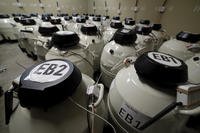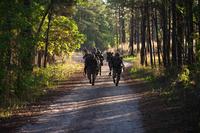Through the sweltering 85-degree Caribbean heat and 79 percent humidity, U.S. Coast Guard members renewed partnerships with 16 other countries during Exercise Tradewinds 2012.
Tradewinds is a chairman of the joint chiefs-directed, U.S. Southern Command-sponsored annual exercise conducted in cooperation with Caribbean basin partner nations, including Antigua and Barbuda, Barbados, Bahamas, Belize, Dominica, Dominican Republic, Grenada, Guyana, Haiti, Jamaica, St. Kitts and Nevis, St. Lucia, St. Vincent and the Grenadines, Suriname, Trinidad, and Tobago.
Every year, the U.S. provides representatives from all five of its military branches as well as agencies like the FBI, Naval Criminal Investigative Service and the Joint Coalition Warfighting Center to share mission-focused knowledge and expertise so each participating country will be able to improve capabilities in what it considers key missions and results in enhanced regional maritime capabilities and security.
The U.S. Coast Guard brought its expertise by providing team coordination training, maritime law enforcement training and training on the incident command structure.
With dozens of islands, each no more than 104 miles apart from any other one, the Caribbean is more of a neighborhood than a group of independent countries. U.S. Coast Guard Cmdr. Tomas Kringel, Tradewinds maritime lead officer, sees a deep importance in making sure that these “neighbors” can effectively operate together if the situation calls for it.
“If I could put it in one sentence, and I don’t know who I’m quoting here, but basically regional challenges require regional solutions,” said Kringle. “What we’re doing is offering them a platform so they can come together and conduct subject matter exchanges and refine their already exceptional skills. So, in the case of a regional incident, they know each other already. They’ve worked together.”
The U.S. Coast Guard has a long history of being team players. With missions that constantly take the smallest U.S. military branch into the literal eye of the storm, having strong ties to both government agencies and industry partners allows the Coast Guard to maintain its diverse swath of responsibilities. It’s this skill in particular that brings America’s maritime first responders to Barbados.
“We bring a lot of interagency and interoperability skills to Tradewinds,” said Kringel. “Whenever we respond, we become part of a bigger team, like during Hurricane Katrina or Deepwater Horizon. We have trained and honed our culture to the point that other agencies look to us when it comes to lasting partnerships.”
“One of the biggest things our partner nations ask us is to try to find a way to work with each of our country’s individual sister agencies, so that they have better partnership collaborations and yet maintain their service or agency integrity,” said Kringel. “And I think we’re definitely doing that here.”
With differing languages and dialects, stepping outside that box can be a daunting task. As the host of much of this year’s Tradewinds event, Barbadian coast cuard Lt. Cmdr. Neville Springer leads by example.
“To me, the most important thing we can take away is if I call SOUTHCOM and talk to Cmdr. Kringel, I’m not speaking to a name. I’m speaking to a face,” said Springer, acting commanding officer of HMBS Pelican. “And when he hears Cmdr. Springer, he can picture me. We’ve interacted and, therefore, we can relate on that personal level and get things done. I think that’s a wonderful thing.”
“I tell my people all the time: if you take anything from Tradewinds, take a friend,” said Springer.




























